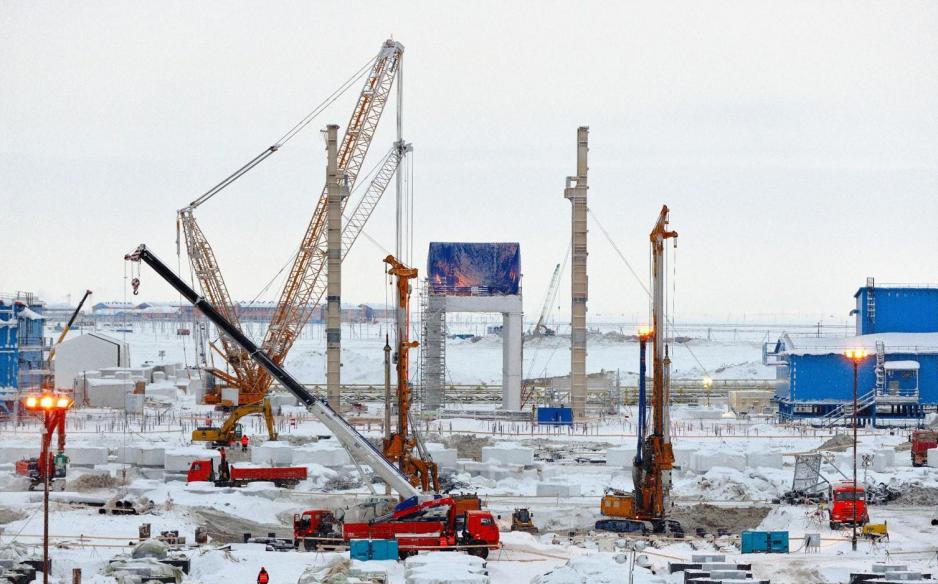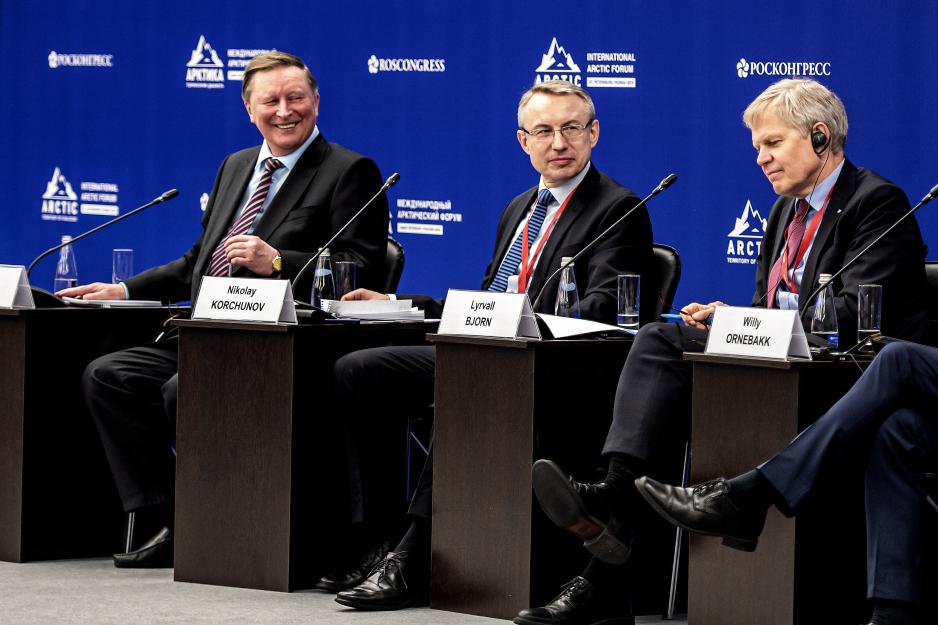Russia Invests Heavily in the Arctic, Top Diplomat Denies Military Intentions

Major industrial development is taking place in the Russian Arctic. Here, the facility from liquefied natural gas (LNG) in Sabetta on the Yamal peninsula, where Russian Novatek holds a 50.1 percent of the shares. Photo: Yamal LNG
The investments Russia is making in the Arctic go to show that we do not consider the Arctic a military theatre, says Russia’s Special Arctic Official, Nikolay Kortshunov. Russia is building up its military in the Arctic to protect its investments in the Arctic, but also warns that a Western troop build-up will fundamentally change the security situation in the region.
“I believe that one of the preconditions for our having a relatively speaking low military tension in the Arctic is due to the fact that there is no NATO strategy for the Arctic. But if a such were to come, that would dramatically change the situation in the region”, says Kortshunov to High North News.
While knowledge, research and climate were among the most debated issues in the plenary sessions during last week’s Arctic meeting place, the Arctic Frontiers conference in Tromsø, Norway, the issue of security politics lurked just below the surface among the many attending diplomats and politicians.
The Norwegian Armed Forces this week reported that the Russian navy has announced test firing of missiles off the coast of Norway. The areas to be used are in international waters, however, they are near the oil production platform Aasta Hansteen off the coast of Nordland county.
Only days after the American Air Force announced that they are testing out the Norwegian island of Jan Mayen as a potential supply base for American military forces, Kortshunov, who is in charge of Arctic issues in the Russian Ministry of Foreign Affairs, talks about what he characterizes as “internationalization of military activities” in the Arctic looks like from Moscow.
Any military conflict or incident in this region undermines our investments.

Russia’s Senior Arctic Official Nikolay Kortshuniv (center) during a panel talk at the Arctic forum in St. Petersburg, April 2019. Photo: Jonas Karlsbakk, the Barents Secretariat
Large amounts from the Arctic
Kortshunov emphasizes that Russia’s goal is to preserve the region as a low-tension area, and denies that the Russian military build-up in the High North has any military offensive purposes.
One third of Russia is located in the Arctic, and these land areas constitute 11 percent of Russia’s accumulated GDP. 20 percent of the country’s exports come from the Arctic.
The money involved in civilian purposes in the Arctic prove that Russia wants stability and calm in this region, Kortshunov argues.
“The investments Russia is making in the Arctic, and is planning to make, go to show that we do not consider the Arctic a military theatre. One has to understand that. Any military conflict or incident in this region would undermine our investments”, says Kortshunov, who denies that the Russian military build-up in the High North has offensive purposes.
“We spend a lot of money, both state and private money, on a series of development projects in the Arctic. And these invetments need security. If they are not secure enough, investors would have to carry a higher cost for safeguarding their investments. And the insecurity would be higher if there were no security. But this is only meant for defense purposes, not as offensive military deployments there", says Kortshunov. He also warns Norway and its western allies in NATO:
“If NATO countries create Arctic military strategies, this will lead to more non-Arctic states entering the region, both from Europe as well as Asia. And of course we are concerned when some states, non-Arctic states, but NATO members, launch their own military Arctic strategies”, Kortshunov says, referring to the French MoD’s launching its Arctic military strategy last autumn.
Svalbard is a challenging issue
How would you describe the relationship between Russia and Norway when it comes to Arctic issues today?
“That is not easy. I am no expert on that bilateral relationship. But we have Svalbard. I believe this will be a difficult issue. We need to discuss it.”
About Svalbard?
“Yes.”
Why?
“Because facilitating activity there is not only in Norway’s best interest. Russia also has an interest in Svalbard”, Kortshunov says, and thus confirms the message from Russian Foreign Minister Sergey Lavrov Tuesday night.
In a remarkable note related to the 100th anniversary of the signing of the Svalbard Treaty, Russia requests a meeting with Norway to discuss what Lavrov refers to as a series of problems related to cooperation on Svalbard.
American troops in Norway
Before Kortshunov became head of Arctic issues at the Russian foreign ministry, he served a.o. as Russia’s permanent representative to NATO. In his New York Times op-ed “You say defense, we see threat” in 2011, Kortshunov explains the Russian view on the missile defense that the defense alliance wanted to build in Europe back then.
Russian authorities have in recent years repeatedly and in no uncertain terms voiced their dissatisfaction with NATO soldiers on Norwegian soil, the massive NATO exercise ‘Trident Juncture’ off the Norwegian coast as well as the upgrading of the Globus radar systems in Vardø, Norway.
It is in particular American soldiers training in Troms and at Værnes (near Trondheim) that has caused Russian reactions. Kortshunov says without beating about the bush that NATO activities on Norwegian territory leads to a destabilization of the region.
“Norway argues that these troops are there on rotational basis and not permanent. But that does not matter. The troops are present, whether they rotate or not.”
The Norwegian view is that the Norwegian government decides who gets to be present on Norwegian soil. And as we are NATO members, we are obliged to receive NATO forces.
“That will lead to an internationalization of military activities in the Arctic, and it will undermine peace and stability in this region. With climate changes, there will be more attention given to the Arctic from third countries. Both because of the resources here, but also because of new shipping and sea routes. The Arctic must be preserved as an area of low tension."
In the Arctic Council and other international forums, one talks about the importance of keeping the Arctic peaceful. How do you see this development in light of US Secretary of State Mike Pompeo’s speech in Rovaniemi last May?
“The ministerial statement sent out as a result of the meeting in Rovaniemi says that the Arctic is to be a low-tension area, an area of peace and constructive cooperation. We support this. However, we do look upon some countries’ attempts at pulling bilateral conflicts with other states into the Arctic with concern.”
Non-Arctic countries are important
Who does that?
“Some countries do this. At least they criticize each other, but they do not bring good arguments into this. And we do not believe that such actions contribute to preserving the Arctic as a place of peaceful cooperation. Non-Arctic states are important. They are to be treated accordingly, and with respect”, Kortshunov says and refers to how within the Arctic Council there is multilateral work going on dealing with a series of issues such as environmental protection, climate, oil protection, rescue at sea, as well as other risks emerging with economic development offshore.
Nevertheless, there is also a development in the military are that worries Kortshunov. He argues that “some states” do not want to talk about this part of development in the Arctic, and refers to how military cooperation was shelved following the [Russian] annexation of the Crimea in 2014.
“If you are interested in de-escalation, you discuss. If you are interested in an escalation, you do not discuss – you act. We belong to the philosophy about unity, which means that managing all kinds of security risks in the Artic region is our shared responsibility."
Do you believe that all Arctic states take this responsibility?
“If you take this responsibility, you talk about all the risks. Including the military ones. An extensive approach to this is the only right thing to do for an Arctic region”, says Kortshunov.
Under the current administration in Washington D.C., do you see a line in which the Arctic Council as well as other Arctic policy areas are pulled increasingly into a conflicting direction?
“We will see. However, last year was not an encouragement, to say the last. The Americans launched two new Arctic strategies, one from the Coast Guard and another one from the military. But there were no strategies for economic or sustainable development", Kortshunov says.
This article was originally published in Norwegian and has been translated by HNN's Elisabeth Bergquist.

